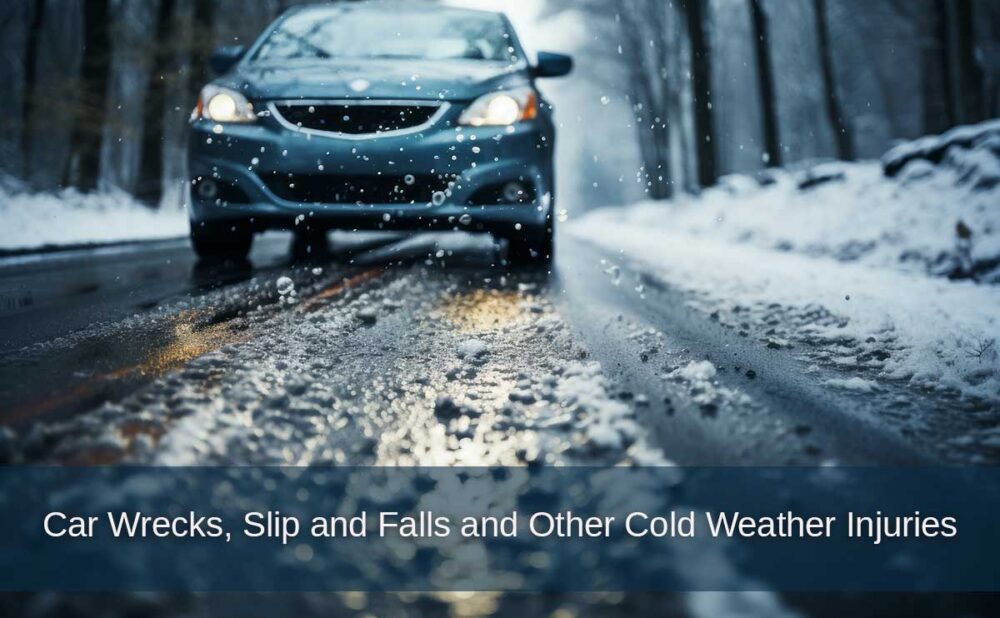Car Wrecks, Slip and Falls, and Other Cold Weather Injuries — What You Need to Know
As the winter season settles in, the drop in temperature brings not only festive cheer and cozy nights but also an increased risk of injuries due to cold weather. Snow, ice, sleet, and freezing rain can create hazardous conditions that lead to accidents, including car wrecks, slip and falls, and other weather-related injuries. Understanding how these risks increase during the winter months and how to stay safe can help reduce the chances of injury and improve your winter experience.
Car Wrecks — Icy Roads and Slippery Conditions
One of the most significant dangers during cold weather is driving. As temperatures drop, roads can quickly turn icy and slippery, especially early in the morning or late at night when the temperature is the lowest. Drivers can lose control of their vehicles because black ice—a thin layer of ice that is often invisible—forms on the road. Snow accumulation, reduced visibility from snowstorms, and slower traffic flow can worsen winter driving conditions.
How to Stay Safe on the Road
- Prepare Your Vehicle. Equip your car for weather conditions before winter hits. Ensure that your tires are winter-ready, with proper tread depth for traction. Check the battery, wipers, and antifreeze levels to prevent breakdowns and improve visibility.
- Slow Down. Adjust your speed to fit the road conditions. On icy or snowy roads, lower your speed even if the posted speed limit seems safe. Give yourself extra time to stop, as braking distances are much longer on slippery surfaces.
- Keep a Safe Following Distance. On slick roads, it’s important to leave more space between your car and the vehicle ahead. A longer following distance gives you more time to react to sudden stops or swerves.
- Avoid Distractions. When driving in winter weather, stay focused on the road. Distracted driving can have serious consequences, especially when conditions are less than ideal.
- Know How to React. If you begin to skid, gently steer in the direction of the skid and refrain from abruptly applying the brakes. Keep your hands on the wheel and stay calm.
Slip and Falls — The Hidden Danger of Ice and Snow
Slip and fall accidents are another common cause of injury in cold weather. Ice can form on sidewalks, driveways, stairs, and parking lots, posing a serious hazard to pedestrians. Even a small amount of ice can cause someone to slip and lose their balance, resulting in sprains, fractures, or even head injuries. People are especially vulnerable when carrying groceries, rushing to work, or not wearing the proper footwear.
Preventing Slip and Fall Injuries
- Wear Proper Footwear. Winter boots with good tread and insulation can make a huge difference in preventing slips. Avoid shoes with smooth soles, which can make it easier to lose your footing.
- Take Small Steps. When walking on slippery surfaces, take shorter steps to maintain balance and avoid sudden shifts that could lead to falls.
- Watch for Ice. Be cautious even if you don’t see snow or ice on the ground. A thin layer of snow or shaded areas can hide ice. Always scan your path and walk more slowly if you suspect ice.
- Salt and Sand. If you’re responsible for maintaining a property, be sure to salt or sand walkways, driveways, and steps to reduce ice accumulation and improve traction.
- Use Handrails. When navigating icy stairs or slopes, always use handrails if available. They can provide crucial support if you slip.
Other Cold Weather Injuries — Frostbite, Hypothermia, and More
While car wrecks and slip-and-fall accidents are the most common injuries during the winter, there are other cold weather-related risks to consider. Two significant ones are frostbite and hypothermia, both of which can occur when exposed to extreme cold for extended periods.
Frostbite
Frostbite occurs when the skin and underlying tissues freeze, most commonly on extremities such as fingers, toes, ears, and the nose. The risk of frostbite increases when the windchill factor is very low, even if temperatures hover just above freezing.
Signs of Frostbite
- Red, white, or pale skin
- Numbness
- A tingling sensation
- Hard or waxy skin
Gently warm the affected areas with warm (not hot) water if you suspect frostbite. Seek medical attention immediately.
Hypothermia
Hypothermia occurs when the body’s core temperature drops below the normal range of 95°F (35°C), and it can be life-threatening if untreated. It’s more common in situations where individuals are wet, exposed to wind, or not dressed warmly enough for the weather.
Signs of Hypothermia
- Shivering
- Confusion
- Slurred speech
- Fatigue
- Clumsiness
In severe cases, people may stop shivering, lose consciousness, or have difficulty moving. If you suspect hypothermia, move the person to a warm place. Cover the person with blankets and seek medical help immediately.
Protecting Yourself from Cold-Weather Injuries
- Dress in Layers. When heading out in cold weather, wear multiple layers of clothing, including moisture-wicking materials to keep sweat off your skin, an insulating layer, and a waterproof outer layer to protect against wind and snow.
- Cover Exposed Skin. Wearing hats, scarves, gloves, and thermal socks can help protect vulnerable body parts from frostbite. Even when the temperature feels warm, people should always prepare for frostbite.
- Limit Exposure. If you need to be outside for extended periods, take breaks indoors to warm up and avoid staying in the cold for too long.
- Stay Hydrated and Nourished. Proper hydration and nutrition help your body generate heat and fight off the effects of cold weather.
Stay Safe This Winter
Winter weather brings its own set of challenges, but with the right precautions, you can reduce the risk of injuries from car wrecks, slip and falls, frostbite, and hypothermia. By preparing for winter conditions, dressing warmly, and staying aware of your surroundings, you can enjoy the season safely. Whether you’re driving on slick roads, walking on icy sidewalks, or simply enjoying the outdoors, keeping these safety tips in mind can help prevent accidents and ensure a safe, injury-free winter.





